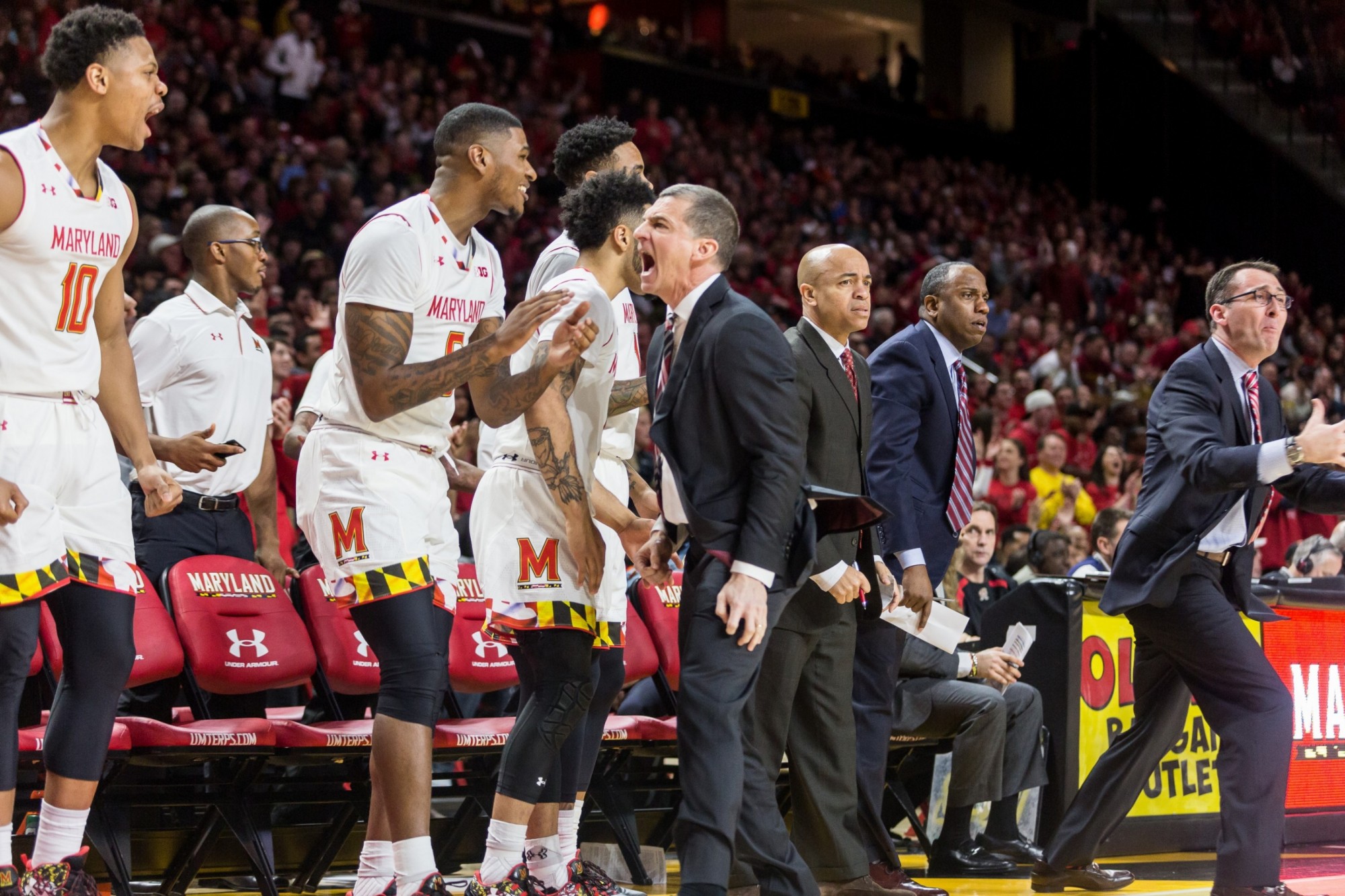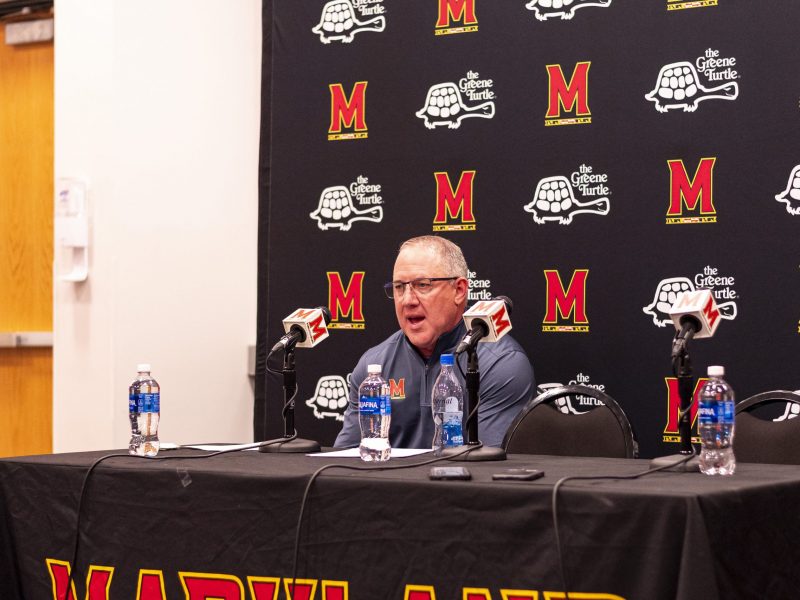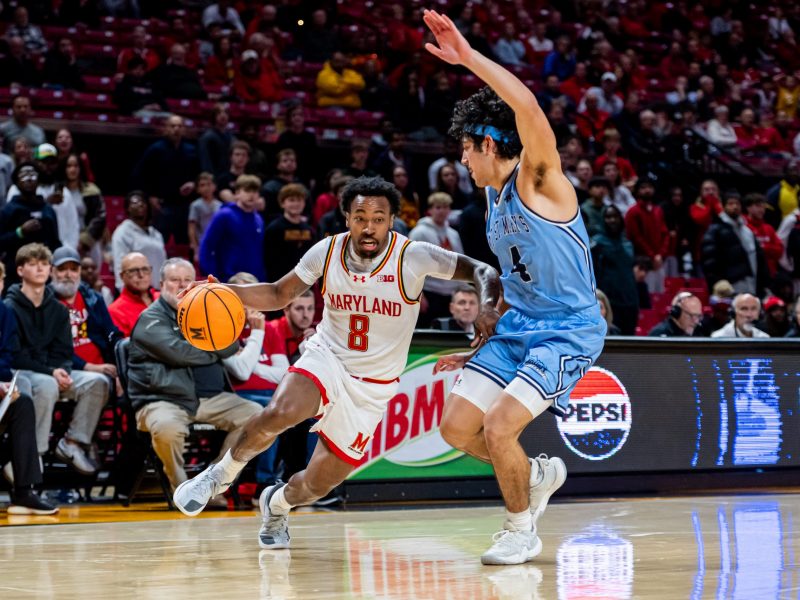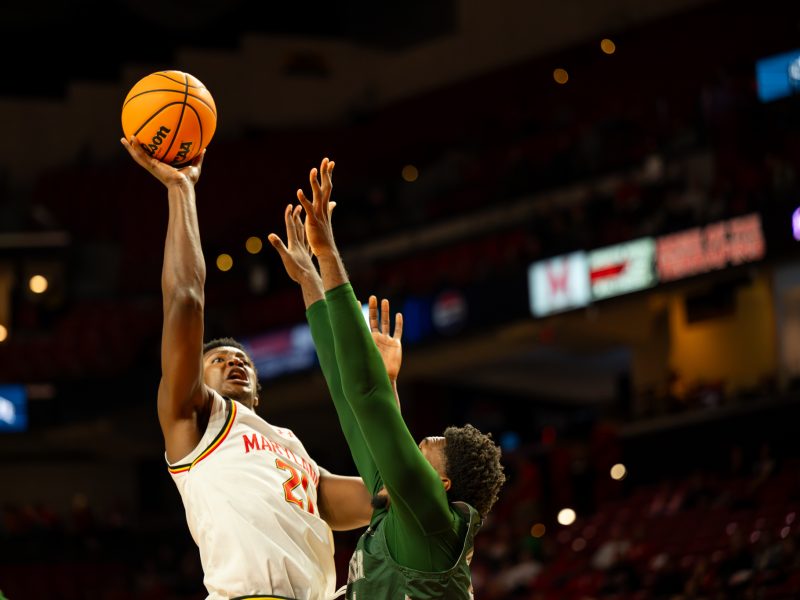Tied at 65 in the waning seconds of its 2014 ACC tournament matchup against Florida State, the Maryland men’s basketball team desperately needed a stop. Failing to force overtime would ensure a fourth straight season without an NCAA tournament bid.
But Seminoles center Boris Bojanovsky converted a wide-open dunk with 0.4 seconds left, and former Maryland guard Dez Wells airballed a full-court heave at the buzzer. A program that had recently made the postseason 17 straight years had just finished the season 17-15, continuing its descent into mediocrity.
Five Terps transferred after the 2013-14 season. Coach Mark Turgeon came under intense scrutiny. The program abandoned its historic ties with the ACC to join the Big Ten.
Since then, however, the Terps have returned to perennial postseason contention. For three straight seasons — and with three distinct rosters — the Terps have won at least 24 games and danced in March. It’s a run of success the school hasn’t enjoyed since the early 2000s, when former coach Gary Williams built a national championship winner.
So, despite the departure of three-time leading scorer Melo Trimble and a tough Big Ten slate that features four top-25 teams, including No. 2 Michigan State, the Terps should enter this year with high expectations. Missing the NCAA tournament would be a bitter disappointment.
[Read more: Anthony Cowan scores 16 points in Maryland basketball’s 96-43 win over UMES]
Turgeon said before Maryland’s season-opening win over Stony Brook that while he wishes Trimble were still around, others are ready to step up. After all, this is not the unit that crashed out of the ACC or the upstart squad that came out of nowhere in 2014-15 by winning 28 games.
We should no longer act surprised by solid play at Xfinity Center.
The Bojanovsky slam was more than three and a half years ago. No one from that Maryland group is still with the program. Most of the players who led the beginning of the Terps’ turnaround are gone, too.
The current team possesses the best returning cast Turgeon has ever had, built around Justin Jackson, Kevin Huerter and Anthony Cowan — three prolific sophomores who complement each other’s styles. A trio by all accounts primed to take a significant step forward, unburdened by the nerves they experienced this time last year.
Just ask junior forward Ivan Bender — who observed them break into the starting lineup as wide-eyed newcomers — about their progress.
“Oh man,” Bender said with a smile. “They don’t even look like sophomores to be honest. … It feels like they’ve been here for years.”
Or ask Turgeon, who reaped the rewards of pushing Jackson, Huerter and Cowan through first-year growing pains to achieve a No. 6 seed in the NCAA tournament.
“Last year their heads were spinning,” Turgeon said. “They’re so much more comfortable with the process. They’ve all gotten better individually as players. It’s just the comfort level and the understanding of what I want [and] the system.”
While Turgeon has started seasons in College Park with more talent, he’s never had the luxury of this many experienced stars.
His first tournament team returned Wells and Jake Layman, but Trimble, then a rookie, powered it. His second tournament team returned Trimble and Layman, but it required boosts from transfers Rasheed Sulaimon and Robert Carter and five-star freshman Diamond Stone. Trimble was the only standout returner on last year’s squad.
Now, the Terps bring back four of their five leading scorers from last season, as well as their top two rebounders. Jackson has drawn 2018 NBA Draft hype. Huerter and Cowan should provide production on both sides of the floor to keep pressure off him.
Senior center Michal Cekovsky presents a quality low-post option to dump the ball into. He scored more than seven points per game in limited minutes a year ago.
Around the returning core, there’s an array of skilled newcomers, such as guard Darryl Morsell and forward Bruno Fernando, to keep opponents guessing. While Trimble undoubtedly carried an alpha-dog mentality that will be hard to replace, his absence has so far been compensated for with improved ball movement.
“We have so many smart guys and so many unselfish guys,” Bender said. “It’s beautiful to play with them.”
It’s unlikely this Maryland team will be a top-3 seed in the NCAA tournament or win the improved Big Ten. But given their mix of skill and experience together — a rarity in the one-and-done era — the Terps should finish with at least 24 wins and reach the NCAA tournament for a fourth consecutive campaign.
As Maryland readied for its first road trip of the season Thursday, Bojanovsky scored four points in a Slovakian league basketball game, where he’s a backup center for BK Levickí Patrioti. Trimble enjoyed the afterglow of a 37-point, eight-assist effort for the G League Iowa Wolves. Huerter, meanwhile, spoke about the Terps’ campaign ahead, acknowledging the increased role the sophomores must carry.
“Coach [Turgeon] is looking at all of us [sophomores] to be more of leaders on the court,” Huerter said. “It’s kind of a transition for us … having more responsibility on us to make plays.”
If Maryland’s second-year starters fail to take the reins, display marked improvement from their rookie seasons and guide the program to success, it’ll be fair to criticize them and blame Turgeon for not capitalizing on his best-ever returning crop.
Those concerns shouldn’t be an issue, as long as the preseason chatter about Jackson, Huerter and Cowan’s development is accurate. There’s no excuse for a team to stumble three years after regaining its stature in the college basketball landscape.



